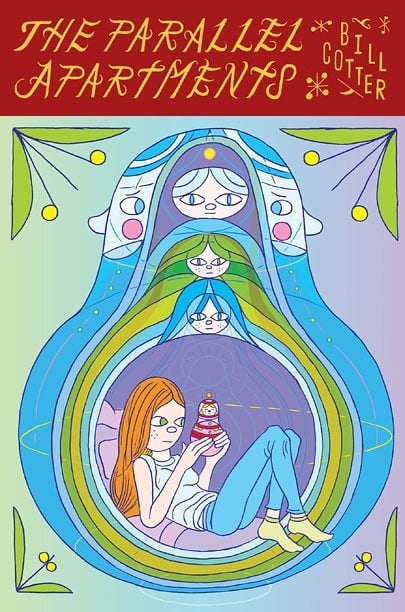
Bill Cotter Tackles Austin, Matriarchy and Maladjustment in The Parallel Apartments
Above: The Parallel Apartments
by Bill Cotter
McSweeney's
500 pages
$25.00
Bill Cotter has a thing for maladjusted characters who transplant their problems from one city to another. His first novel, Fever Chart, traced its dysfunctional lead from Boston to New Orleans, while Justine Moppett, the heroine of his second, The Parallel Apartments, carts her neuroses from New York to Austin in search of answers.
Cotter will be at Austin’s BookPeople on February 25 at 7 p.m. to read from The Parallel Apartments; he will be joined by performance artists Annie La Ganga and Rebecca Beegle, also known as The Grownup Lady Story Company. In keeping with the women’s stories within The Parallel Apartments, La Ganga and Beegle will each tell hilariously true stories of their own.
Though he was born in Dallas, Cotter has lived in Austin for the last 17 years and considers it home. It was Austin that gave him the idea that would become The Parallel Apartments, so he decided that in Austin the story would stay. “One time I was in Austin driving around with my mother, and she pulled the car over on Avenue G, I think it was, and pointed at a duplex across the street,” Cotter says. “There were weeds in the yard, those fancy artisanal chickens you see sometimes, and she pointed to the place and said, ‘Bill, that’s where you were conceived.’ My mother is not one to confess that sort of thing, and so at the time the idea of a fictional character came to me, a character returning to their place of conception instead of their place of birth, hoping to find the answers to some mysteries. I don’t think I could have set it in any other city but Austin.”
The book’s promotional material makes The Parallel Apartments sound like a Pedro Almodóvar film—full of color, and featuring an ensemble of bizarre yet lovable characters including at least one transvestite—but they give nothing away about what Cotter says the book is really about. “I had this story that I wanted to tell about a matriarchy and the matriarch herself. It’s about these five generations of Austin women. And the middle three generations, they’re mutually estranged,” Cotter says. “And the story is about the circumstances of their estrangement and how they’re trying to solve it, how they’re trying to get over it, get around it, and get back together again.”
Cotter says he grew up surrounded by powerful women, and although he found the concept of matriarchy intriguing, at times he found himself doubting his ability to portray women accurately and authentically—and almost abandoned the story completely. “I really struggled with this book in this way. I am writing about women, and I’m writing about women from the first person, from their perspective, and I’m not a woman, and I think it’s a kind of arrogance for me to try and write about that,” Cotter says. “I didn’t want to be seen as presumptuous and arrogant, but at the same time it fascinates me and I wanted to explore it. Whether I succeeded or not I don’t know.”
The Parallel Apartments is difficult to define. One part kooky comedy, one part family drama, one part exploration of womanhood, and one part gruesome catalogue of emotional dysfunction, Cotter’s second novel defies any particular genre, except, perhaps, Cotter’s own. Protagonist Justine Moppett has an obsession with creating collages, and The Parallel Apartments is its own kind of collage, pieced together from scraps of Cotter’s own psyche. “I guess I’m pretty maladjusted myself, and that’s not to say I’m interested in myself, but I’m interested in characters that aren’t quite normal. They haven’t made it. They’ve been mishandled by providence some way or another,” Cotter says. “They hold more interest for me—someone that’s been damaged in their life, and are trying to heal themselves.”
To support journalism like this, donate to the Texas Observer.

